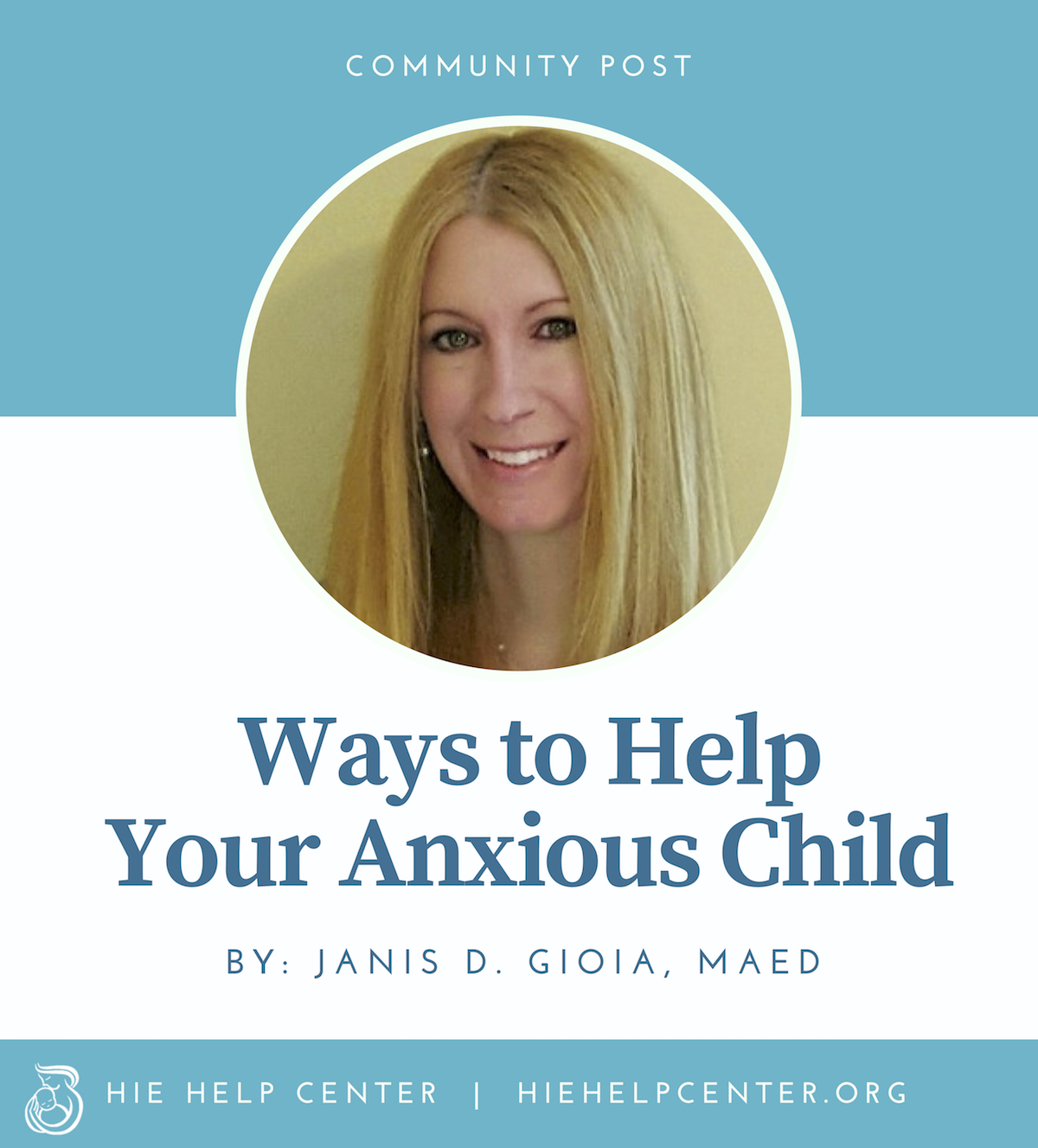By Janis D. Gioia, MAEd.
Anxiety.
It’s one of those unfortunate equalizers that steals peace and joy from you and your child, regardless of the diagnosis or challenges you face.
As a teacher and advocate for children with different abilities, disabilities, and mental health challenges, I have found that every child, and all parents, struggle with anxiety.
Anxiety has many symptoms and causes lots of distress.
You might see these signs of anxiety in your child or in yourself:
Physical signs of anxiety:
- Racing heart
- Dry mouth
- Shaking
- Shortness of breath
Behavioral signs of anxiety:
- Anger
- Avoidance
- Clinginess
- Depression
- Eating Disturbances
- Inflexibility
- Irritability
- Negativity
- Perfectionism
- Restlessness
- Sleep disturbances
- Tantrums
Anxious children might experience panic attacks, have trouble falling and staying asleep, struggle to make friends, and develop school phobia.
Research shows that chronic anxiety and persistent fear have negative effects on a child’s brain development. When learning and memory are negatively impacted, children typically have less academic success. Adults aren’t immune from anxiety’s effects either. A recent study indicates that adults with chronic anxiety have a reduced lifespan.
While you can’t wave a magic wand and make anxiety disappear, there are many ways to help your anxious child find peace for mind, body, and spirit.
Anxiety is a serious mental health disorder that should be addressed with your child’s doctor and medical team. Here are a few ideas to discuss with your child’s medical team:
Mind:
Read your child a soothing story.
Reach for a story to ease transitions, to prevent a tantrum when you see one brewing or to distract a child from worry.
Books have the ability to calm and comfort children with anxiety, autism, depression, and other mental health challenges and disabilities.
Books with nature scenes and beautiful illustrations are good choices.
As you read the story, comment on the soothing colors, textures, or the mood the illustrations evoke.
The story and the illustrations replace fear through art and imagination.
Many choose to read in a favorite quiet space with soft lighting and relaxing music in the background and a soft blanket for extra comfort.
However, children can be anxious anytime, anywhere.
I have read books on a school bus headed to a museum and in a coat room to calm a child with school anxiety who had hidden in his cubby.
Pack books with you for a doctor’s or dentist’s appointments, holiday gatherings at homes of family or friends, or any place where your child might feel overwhelmed and anxious.
Getting lost in the magic and beauty of a story can transport children (and adults) into a peaceful place.
Body
Weighted blankets have been getting a lot of positive press lately. Many research studies confirm that weighted blankets help calm anxiety by their gentle deep-pressure touch.
In my classroom, we also used weighted lap pads to help calm and ground children with anxiety or autism spectrum disorders. Smaller weighted lap pads that can be microwaved are great for many children, as warm weight can be especially effective in calming anxiety.
If your child likes the feeling of deep pressure touch, consider using a weighted lap pad for times and situations that cause anxiety.
Many children use weighted lap pads for homework time, car rides, and to help them focus and stay seated in school.
Remember: calming the body also calms the mind.
Spirit
One of the best ways to calm your mind and renew your spirit is found right outside your door. It’s free and available 24/7.
Spending time in nature reduces anxiety and depression for many.
Take your children outside. Any season, any time.
If you’re lucky enough, walk on a winding path through the woods.
Listen to nature’s symphony, wind gently moving through the trees, the whispering water of a rocky creek, the song of a bird overhead.
And if you don’t live near the woods, just step outside your front door.
Breathe fresh air.
Enjoy the splendor of a sunrise or sunset.
Watch stars begin to appear in the darkening night sky.
Time spent in nature gives a new perspective. Worries seem smaller. Possibilities seem larger.
You find hope and peace and rest for your soul.
Time spent in nature has a cumulative effect. The more time you spend in nature, the more calm and grounded you and your child feel.
To learn more ways to comfort anxious children, mind body and spirit, visit www.comfortinganxiouschildren.com.
While there you can download the free guide: Comfort Your Anxious Child Now with more ideas to calm and comfort.




Leave a Reply
You must be logged in to post a comment.